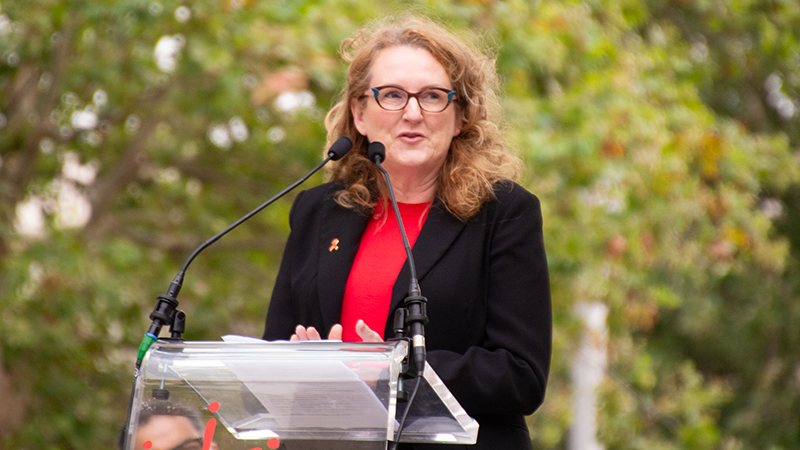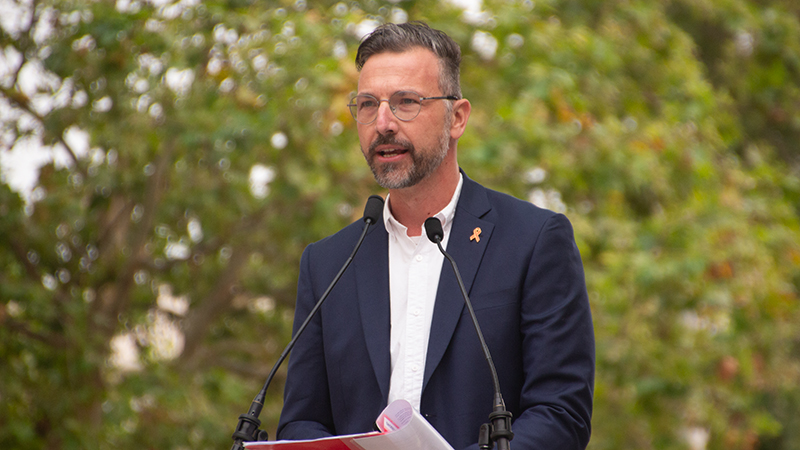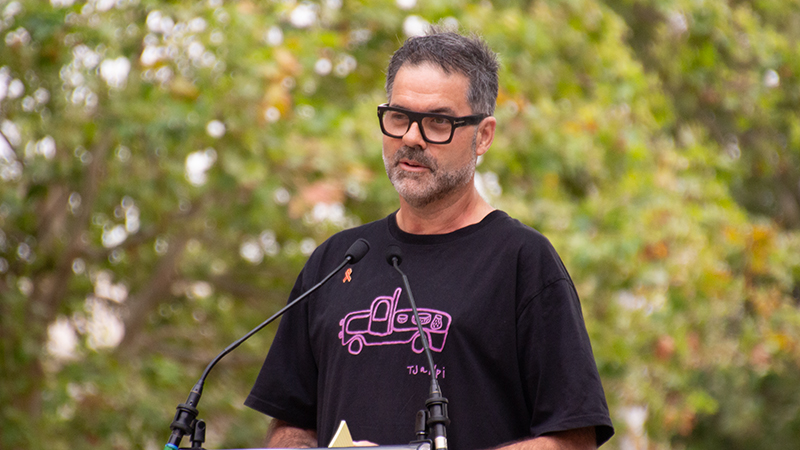World AIDS Day will be marked on Sunday 1st December, the annual day that marks our progress in tackling the spread and effects of HIV.
On Friday morning members of the Perth community gathered for the annual World AIDS Day breakfast in Forrest Place where politicians, advocates and medical experts spoke about the progress over the last four decades, and the challenges that still lay ahead.
The recently launched campaign ‘It starts with me” campaign asks everyone to think about what they can personally do to raise awareness, provide support and take action.

Representing the Minister for Health at the breakfast event on Friday morning Dr Katrina Stratton MLA, praised the work of doctors, health workers, community volunteers and those living with HIV, and those loving people lost to the virus.
“It can be a bittersweet day to come together and remember loved ones lost to AIDS, but we also reflect on how far we’ve come in response to this virus.” Dr Stratton said.
Western Australian has had significant progress in tackling levels of HIV
Praising the work of WAAC, formerly the WA AIDS Council, Stratton said Western Australia had made significant progress in recent year in achieving the goals of 95-95-95, a desire to see 95% of people living with HIV know their HIV status, 95% of people who know their status are receiving HIV treatment, and 95% of people on treatment are virally suppressed.
“We can proudly say that we have indeed made significant progress. Gains made in our state have seen a significant decrease in HIV notifications in populations with previously higher prevalence, and our strong health system and our links to HIV care last year saw around 94% of people who are aware of their HIV status on treatment for their illness, and of those people on effective HIV treatment, 98% were being virally suppressed.” Dr Stratton said.
“These are positive statistics. They reflect today’s public health efforts which are working towards achieving excellent health and social outcomes for people living with HIV.”
Dr Stratton said the future was very optimistic, noting that new treatment regimes were being rolled out for those living with HIV.
“On the horizon are injectable options that can be administered once or twice a year, a game changer for people with HIV, and the goal by 2030 is that community transmission of HIV is virtually eliminated.
“And key strategies to achieving this goal are the continued meaningful engagement and leadership by the people in communities affected by HIV and community partnerships people who are here today, and as we track closer to that goal, it is fair to say that the future of the HIV epidemic in Australia is optimistic.” Dr Stratton said.

Dr Daniel Vujcich, the CEO of WAAC, spoke about the challenges of reaching people who are still at risk of being exposed to HIV.
While improvements in science has made massive difference to treatments for people living with the virus, and PrEP treatment has protected those at risk of being exposed, Dr Vujcich said the work that lay ahead for organisations like WAAC was still very challenging.
Australia is on track to read virtual elimination of new cases by 2030, but there will still be some people discovering that they have HIV, and to reach out to those populations, Dr Vujcich says a rethink is required.
For the CEO of WAAC a new lens is needed to look at the road ahead, and he offered three different perspective, an equitable lens, a realist lens and a moral view.
The equitable lens
Dr Vucjcich argues that its essential the health organsations be guided by statistics, but keep the actual people they represent front and centre in their delivery of services.
“We see the people behind the numbers. So virtual elimination might mean no more than 90 new cases a year. But who will those 90 people be? It’s important to not think about them as statistics. They will be people.
“There will be overseas born, people unfamiliar with a healthcare system that doesn’t speak to their fears or meet their needs. There will be men who have sex with men, but who cannot call themselves gay or bisexual because of the ongoing stigma attached to being queer in this country.
“There will be women who haven’t benefited from the game changing introduction of prep because of a misperception that women don’t get HIV. There’ll be First Nations people. There will be street present people, and there’ll be any other group of people that have been systematically let down by the system.
“And perhaps most Concerningly, there will be people who will be diagnosed late and who will present with advanced HIV related complications, and for whom everything that we now say about HIV being very manageable is less likely to apply.
“When we look through the equitable lens, it’s clear that we cannot come to the end and then stop.” Dr Vucjcich said.
A realist lens
“When we apply the realist lens, we see that virtual elimination is not the epidemiological equivalent of a happily ever after. Virtual elimination doesn’t mean that the job is done and that there’s nothing left to do.
“Instead, it’s a sign that the job is being done, and that it needs to keep being done. As soon as we stop disseminating prep messaging, HIV will rise.
“As soon as we stop educating communities, HIV will rise. And as soon as we stop making testing and treatment accessible, HIV will rise.
As soon as we stop supporting people living with HIV to manage their health, HIV will rise.
“So let’s not confuse ourselves by thinking that virtual elimination is the absence of HIV. Instead, it’s the absence of complacency. It’s the presence of effort and of vigilance and of continuity.” the WAAC CEO said.
A moral lens
“Through the moral lens, we see that virtual elimination is not just about preventing new cases. It’s about safeguarding the quality of life and dignity of those people already living with HIV
“With each new diagnosis, that cohort of people living with HIV gets a little bigger, and while new cases might become rarer, the needs of those already diagnosed people will not fade. In fact, in some cases, their needs may grow more complex as they confront the challenges of surviving and aging with a virus that was never designed to allow either.
“Our responsibility does not shrink as the number of new cases declines. Our responsibility grows. It calls us to double down on our efforts to provide care and psychological support and a community free from judgment for exclusion.
“It demands that we meet the needs of people living with HIV with unwavering compassion and resolve, because dignity is not negotiable.
“We need to care as deeply about reducing HIV stigma as we care about reducing HIV cases through the moral lens, it’s undeniable that we cannot come to the end and then stop. So let’s resist the temptation to declare victory when so much work remains unfinished. Virtual elimination is not the end.” Dr Vucjcich said.
There can be no complacency in the final mile
Reflecting on the theme of this year’s celebrations, Dr Vucjcich said it was essential that people did not become complacent.
“It reminds us that HIV information and care and support and respect must reach every community and every individual, without exception, so viewed through the lenses of equity, realism and morality.
“This year’s World AIDS Day theme reminds me that the refusal to tolerate inequality and HIV outcome starts with me, the rejection of HIV complacency starts with me, and the commitment to not turn out the lights of 29,000 people already living with HIV starts with me.
“Near enough is not good enough, and when it comes to the end of HIV, it has to be all or nothing.”

Dianne Lloyd spoke about her experience of living with HIV, and stressed that HIV is everybody’s concern.
“It starts with me, it starts with you, and it starts with all of us.” Lloyd said.
“I realised something very important in the early days when I was diagnosed. It doesn’t matter what others think of me, I need first of all to accept myself.” Lloyd said,
“It starts with self acceptance, the understanding that I am worthy of love, good health care, accessible treatments and respect.”, the health advocate said, noting that for many people living with HIV this could be very challenging.
Despite advances in medical treatment Lloyd noted that stigma and disclination still exist.
“There are things to administer, advances and treatments that is changing all the time – which is great, but we still experience stigma and discrimination.” Lloyd said.
“HIV has become silent. It’s time to end the silence. It’s time to break down the barriers, and it’s time to speak up. Each of us holds the power to make a change, whether through small acts of kindness or large scale advocacy.” Lloyd said.

Calls for improvement to sex education in schools
Dr Fergus McCabe spoke about his experience as a health worker and how things have changed over the decades.
He also noted alarm over how much teenagers today know about HIV, a challenge that became clear after his son interviewed his peers about what they knew about HIV.
“It’s scary what these kids think and what they believe. It’s scary how little education they have anymore on HIV.
“These these boys thought you could catch HIV if you coughed on somebody, if you spat on somebody, they thought it was caught by bestiality. Their only access to information was social media, the most educated one, the one that knew most about it. I got it from the television program.
“They got no sexual education, HIV education in school whatsoever, and that’s a dire diagnosis.” Dr McCabe said.




